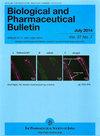口服聚乳酸乙烯-丙烯酸(PLGA)纳米颗粒将反义寡核苷酸输送到胃肠道炎症病变部位
IF 1.7
4区 医学
Q3 PHARMACOLOGY & PHARMACY
引用次数: 0
摘要
在这项研究中,我们制备了适合口服的反义寡核苷酸(ASO)包封纳米粒子(NPs),用于治疗炎症性肠病(IBD)。我们选择了一种水包油(w/o/w)法制备这种纳米粒子,使用聚乳酸-共聚乙二醇(poly(lactide-co-glycolide)作为基质,Pluronic作为稳定剂。得到的 NPs 直径(158 nm)适合穿透粘液层,被肠道细胞内摄,并在肠道炎症病灶中积聚。NPs 中的 ASO 含量相对较高(6.41%(w/w))。当 NPs 稳定地分散在模拟胃肠道(GI)汁液的溶液中时,ASOs 在所需时间内的泄漏量极少。给由葡聚糖硫酸钠诱发结肠炎的小鼠口服 NPs 后,小鼠结肠和直肠中的靶基因表达减少,而裸体 ASO 给药不会导致基因表达减少。因此,NPs 有可能成为治疗 IBD 的 ASO 口服载体,专门针对消化道炎症病变,从而减少 ASO 的非特异性毒性作用。本文章由计算机程序翻译,如有差异,请以英文原文为准。
Oral Administration of PLGA Nanoparticles to Deliver Antisense Oligonucleotides to Inflammatory Lesions in the Gastrointestinal Tract.
In this study, we prepared antisense oligonucleotide (ASO)-encapsulated nanoparticles (NPs) with a suitable profile for oral administration for the treatment of inflammatory bowel disease (IBD). We chose a water-in-oil-in-water (w/o/w) method to prepare the NPs using poly(lactide-co-glycolide) as a matrix and Pluronic as a stabilizer. The obtained NPs had a suitable diameter (158 nm) for the penetration of the mucus layer, endocytic uptake by enterocytes, and accumulation in inflammatory lesions in the intestine. The amount of ASOs in the NPs was relatively large (6.41% (w/w)). When the NPs were stably dispersed in solutions that mimicked gastrointestinal (GI) juice, minimal leakage of ASOs was demonstrated over the required period. The NPs were administered orally to mice with colitis induced by dextran sodium sulfate, which reduced target gene expression in the colons and rectums of the mice, whereas naked ASO administration caused no reduction in gene expression. Thus, the NPs have the potential of promising oral carriers of ASOs for the treatment of IBD that specifically target inflammatory lesions in the GI tract, thereby reducing the non-specific toxic effects of ASOs.
求助全文
通过发布文献求助,成功后即可免费获取论文全文。
去求助
来源期刊
CiteScore
3.50
自引率
5.00%
发文量
247
审稿时长
2 months
期刊介绍:
Biological and Pharmaceutical Bulletin (Biol. Pharm. Bull.) began publication in 1978 as the Journal of Pharmacobio-Dynamics. It covers various biological topics in the pharmaceutical and health sciences. A fourth Society journal, the Journal of Health Science, was merged with Biol. Pharm. Bull. in 2012.
The main aim of the Society’s journals is to advance the pharmaceutical sciences with research reports, information exchange, and high-quality discussion. The average review time for articles submitted to the journals is around one month for first decision. The complete texts of all of the Society’s journals can be freely accessed through J-STAGE. The Society’s editorial committee hopes that the content of its journals will be useful to your research, and also invites you to submit your own work to the journals.

 求助内容:
求助内容: 应助结果提醒方式:
应助结果提醒方式:


